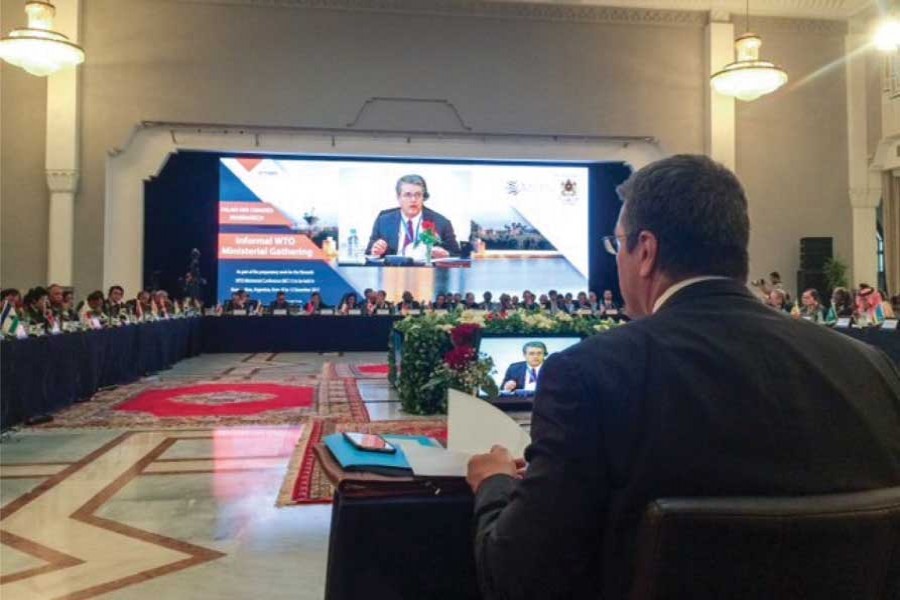More than 23 years ago, Marrakesh, a tourist-loving city of Morocco, witnessed a historical deal and also became a part of the deal by name. On April 15 of 1994, the Marrakesh Declaration was adopted by 124 nations to conclude the Uruguay Round of Multilateral Trade Negotiations and subsequently establish the World Trade Organisation (WTO). 23 years later, on October 09-10 of this year, some 40 important member countries of the WTO met in Marrakesh to prioritise the deliverables of the upcoming 11th ministerial conference (MC11) of the WTO which is going to take place in the Argentine capital Buenos Aires on December 10-13 this year.
LDC GROUP: In the Marrakesh meet, only Cambodia, the LDC coordinator, and Benin were invited from the LDC group. Bangladesh, the largest economy among the LDCs, was not invited. The country has become less engaged in the multilateral trade negotiation process since the 2015 Nairobi ministerial (MC10) where it acted as the LDC coordinator.
Lack of enthusiasm to be actively engaged in the global trade negotiation process now puts Bangladesh on the sideline. It is not clear why Bangladesh did not take any interest to participate in the Marrakesh meeting. Though participants joined by invitation, some lobbying was needed. By attending the meeting Bangladesh could have drawn some attention of the leading players of the ongoing negotiations and also understand the trend and future directions in a better manner. This would have helped the country to prepare for the Buenos Aires meet in December.
DIVERGENCE OF VIEWS: As huge gap exists on the deliverables of the MC11 due to divergence of interests among the WTO member countries. The meeting in Marrakesh was intended to reduce the gap. Argentina and Morocco jointly organised the event to reach a preliminary consensus on setting the deliverables for Buenos Aires.
It is learnt from different sources that the Marrakesh meeting didn't produce any fruitful outcome. Participants discussed the issues but couldn't reach any kind of conclusion to prioritise those for Buenos Aires. They discussed the critical issues like trade distorting subsidies in agriculture, permanent solution of the public stockholding for food security, special safeguard mechanism, disciplining the unregulated fisheries subsidies and LDCs issues. They also talked about electronic commerce, investment facilitation and Micro, Small and Medium Enterprises (MSMEs).
All the issues are in discussion for more than a year. In fact, since the Nairobi ministerial meeting in 2015, WTO members are divided on prolonging the Doha Round negotiations to formulate multilateral trade rules on agriculture, industry and services. While developed and a few developing countries want to negotiate some new issues, a large number of developing and Least Developed Countries (LDCs) want to finish the unfinished issues of the Doha negotiation. Thus, division among the members widened. There was an expectation, though low, that the Marrakesh meet might reduce the gap.
However, statements issued by the participants make it clear that the gap still persists. For instance, after the meeting, WTO chief Roberto Azevedo said that though there were some promising issues on the table, in all areas there was still a lot of work to do. It clearly indicates that no consensus was reached in Marrakesh to prioritise the issues for MC11.
The director general also said: "We should also work to ensure that we get the balance right in assessing the issues that we think we can advance at MC11 and those where further work will be required." It also means that members have to continue to work in the next six to seven weeks to prioritise the issues or deliverables in Buenos Aires.
In the Marrakesh meeting a large number of developing countries, led by India and Indonesia, reasserted their demand on permanent solution on public stockholding for food security. But they didn't get any positive hint that the issue might be a priority deliverable in MC11. Thus, the countries have to continue their intense effort until Buenos Aires to make a deal in this regard. In a similar vein, countries pushing for the new issues like e-commerce also demanded a deal in these areas.
Argentina, the host country of MC11, mentioned in a press statement that the meeting 'took place in a constructive atmosphere' and the 37 participating trade ministers 'pledged to make the greatest efforts' to materialise advances in December in Buenos Aires, which would strengthen the multilateral trading system in the face of the challenges. The statement also makes it clear that sharp division prevailed and is likely to continue.
The movement immediately after the Marrakesh, however, indicates that a compromise may be reached among the leading members for setting the deliverables in Buenos Aires. Those who are in favour of completion of the Doha round agenda may see that a few critical issues of their interest are in the final deal in exchange of inclusion of some new issues pushed by the developed countries.
This line of compromise is getting clearer day by day. Talking with a trade diplomat in Geneva, it has been learnt that those who are seriously opposing new issues have already found it difficult to resist these. The stronger the resistance, the harder it becomes for them to make their issues deliverable.


